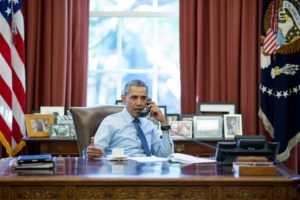by WorldTribune Staff, January 9, 2017
President Barack Obama has opted to keep his presidential records under wraps for 12 years after he leaves office on Jan. 20.
Obama sent a letter to the National Archives in July authorizing close aide Anita Decker Breckenridge to act as his representative in the release of his White House records in future decades.

The letter was released to Politico on Jan. 6 under the Freedom of Information Act.
Obama’s notice, dated July 26, 2016, means that if he were to die or become incapacitated before 2029, Breckenridge would retain discretion over which advice and appointment-related records should be made public, according to Politico.
“If a president were to die in office without signing a letter similar to the one Obama signed in July, much of that confidential advice could go public after five years,” the Politico report said.
Both Presidents Bill Clinton and George W. Bush signed their restriction letters less than two years after taking office. Obama waited until year eight of his presidency to sign his.
Clinton’s notice, signed in 1994, named then-first lady Hillary Clinton and close adviser Bruce Lindsey as official representatives under the Presidential Records Act.
Clinton’s letter was the subject of controversy in 2007 during Hillary Clinton’s first bid for the presidency.
During a nationally televised debate between Hillary Clinton and Obama, late NBC Washington Bureau Chief Tim Russert said the directive put any White House records of communications between the former first lady and her husband off limits until 2012. “Would you lift that ban?” Russert asked.
“We’ll move as quickly as our circumstances and the processes of the National Archives permits,” Hillary Clinton responded.
Obama objected, calling the secrecy “a problem” that made it hard for Democrats to criticize Bush for leading “one of the most secretive administrations in our history.”
Bill Clinton later said that his wife had been sandbagged and that Russert had mischaracterized the letter.
“She was incidental to the letter,” the former president insisted. “It was a letter to speed up presidential releases, not to slow them down.”
On his first day in office, Obama rolled back a Bush executive order that historians said gave the families of deceased presidents too much power to withhold presidential records.
